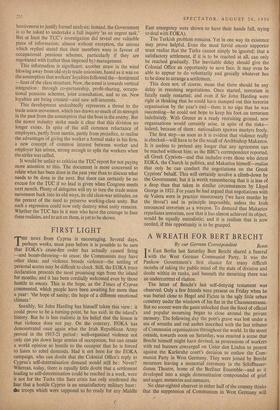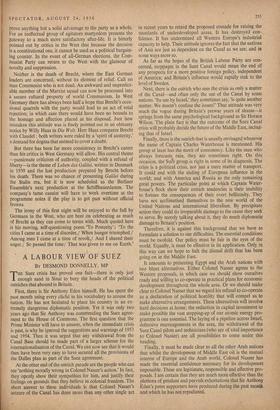A WREATH FOR BERT BRECHT
By our German Correspondent Bonn IN East Berlin last Saturday Bert Brecht shared a funeral with the West German Communist Party. It was the Pankow Government's first chance for many difficult months of taking the public mind off the state of division and doubt within its ranks, and beneath the mourning there was an undercurrent of elation.
The letter of Brecht's last self-denying testament was observed. Only a few friends were present on Friday when he was buried close to Hegel and Fichte in the ugly little urban cemetery under the windows of his flat in the Chausseestrasse. But no sooner were the gates unlocked than the flood of official and popular mourning began to close around the private memory. The following day the poet's grave was lost under a sea of wreaths and red sashes inscribed with the last tributes of Communist organisations throughout the world. In the street outside, towards noon on Saturday, was enacted a scene that Brecht himself might have devised, as processions of workers with red banners converged on Unter den Linden to protest against the Karlsruhe court's decision to outlaw the Corn- munist Party in West Germany. They were joined by Brecht mourners leaving a memorial ceremony in the Schiffbauer- damm Theatre, home of the Berliner Ensemble—and so it developed into a single demonstration compounded of grief and anger, memories and menaces.
No clear-sighted observer in either half of the country thinks that the suppression of Communism in West Germany will prove anything but a solid advantage to the party as a whole. For an ineffectual group of agitators martyrdom presents the gateway to a much more satisfactory after-life. It is bitterly pointed out by critics in the West that because the decision is a constitutional, one, it cannot be used as a political bargain- ing counter. In the event of all-German elections, the Com- munist Party can return to the West with the glamour of novelty and suppression.
Neither is the death of Brecht, where the East German leaders are concerned, without its element of relief. Call no man Communist who is not dead. An awkward and unpredict- able member of the Marxist squad can now be processed into a secure cultural property of world Communism. In West Germany there has always been half a hope that Brecht's occa- sional quarrels with the party would lead to an act of total rejection; in which case there would have been no bounds to the homage and affection placed at his disposal. Just how mistaken this attitude was is finely pointed out in an obituary notice by Willy Haas in Die Welt. Herr Haas compares Brecht with Claudel : both writers were ruled by a 'spirit of austerity,' a demand for dogma that seemed to cover a doubt.
But there has been far more consistency in Brecht's career than his critics in West Germany will allow. His central theme —passionate criticism of authority, coupled with a refusal of liberty—is the theme of Leben des Galilei, written in Denmark in 1939 and the last production prepared by Brecht before his death. There was no chance of presenting Galilei during the Stalin era, but it is now scheduled as the Berliner Ensemble's next production at the Schiffbauerdamm. The company's tame casuist will have to work overtime at the programme notes if the play is to get past without official frowns.
The irony of this first night will be enjoyed to the full by Germans in the West, who are bent on celebrating as much of Brecht as they can come to terms with. Much quoted here is his moving, self-questioning poem `To Posterity'.: 'To the cities I came at a time of disorder,/ When hunger triumphed./ Among men I came at a time of revolt,/ And I shared their anger./ So passed the time/ That was given to me on Earth.'



























 Previous page
Previous page